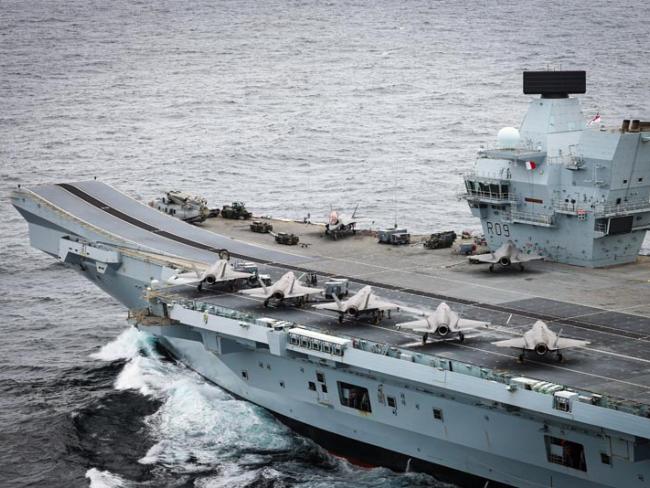
UK Carrier Strike Group on Operation Highmast, the British-led Carrier Strike Group, which began operations in the Indo Pacific region in June.. LPhot Bill Spur/Crown Copyright 2025.
Keir Starmer and his government do not defend Britain. They do not act in our interests but cynically pretend that they do…
Cabinet ministers talk about a “defence dividend” and about defence spending growing the economy and improving our lives. Khem Rogaly, a researcher at think tank Common Wealth, has studied the relations of defence spending and jobs and observes that this “is not a viable strategy for growth or the creation of good jobs nationally”. Investment in industry is welcome, but an industrial strategy that focuses on the stockpiling of armaments is not aimed at improving our lives.
Hoodwinking
The attempts to hoodwink us keep coming. When Starmer launched the government’s Strategic Defence Review on 2 June he chose to do so at the Govan shipyard on the Clyde – now owned by BAE Systems. He talked about “a battle-ready, armour-clad nation” and of British “warriors”.
When NATO Secretary General Mark Rutte visited Britain, Defence Secretary John Healey chose to take him on a tour of Sheffield Forgemasters, a heavy engineering company that specialises in the production of large steel castings and which was nationalised by the previous government in 2021.
Suddenly British politicians claim to see the importance of, and to value, British industry.
Of course, industry is vital to Britain’s ability to meet the needs of its population. And of course, we must be able to defend ourselves as a country, which means that we must have a defence industry, and armed forces focused on the defence of the country.
‘NATO stands for war, not for peace…’
Instead Starmer says that our defence policy must always be “NATO first” and that Britain must be the fastest innovator in NATO. While Mark Rutte suggests that unless Britain increases defence spending to 5 per cent of GDP – sacrificing health care and pensions, if that’s what it takes – then we’d better be ready to speak Russian. Our rulers are telling us that President Putin is the new Hitler. They tell us that we are in 1939 all over again. But NATO is expansionist. NATO stands for war, not for peace.
NATO was founded in 1949 by Britain, the USA, Belgium, Canada, Denmark, France, Iceland, Italy, Luxembourg, the Netherlands, Norway and Portugal. Its creators claimed that the alliance was a necessary defence against the Soviet Union. In response the Warsaw Pact was formed by the Soviet Union and its allies in 1955. In the 1950s, Greece, Turkey and West Germany joined NATO, followed by Spain in 1982.
When the Soviet Union collapsed in 1991 the Warsaw Pact was dissolved, but NATO was not, and it has expanded ever since. In March 1999, Hungary, Poland and the Czech Republic were all admitted as full members. Ten days later they found themselves at war with their neighbour Yugoslavia, as part of NATO’s illegal bombing campaign.
Operations
At NATO’s fiftieth anniversary conference in Washington in 1999, a new “Strategic Concept” was adopted with the aim to include operations anywhere on the Eurasian landmass.
And the NATO expansion continues. In 2009 the Balkans, Albania and Croatia became members, with Montenegro joining in 2017 and North Macedonia in 2020. And Bosnia and Herzegovina, formed out of the break-up of Yugoslavia, is closely tied to NATO.
Elsewhere in Europe, Estonia, Latvia, Lithuania, Slovenia, Slovakia, Bulgaria and Romania were admitted in 2004.
This scale of expansion contributes to international tension as Russia sees itself increasingly surrounded by US and NATO bases. In the past few years, NATO exacerbated the situation by encouraging Ukrainian and Georgian membership and announcing new bases in Eastern Europe.
Neutrality abandoned
Since 2008, long before Russia’s invasion of Ukraine in early 2022, Kiev has been told its future is in NATO. And Baltic nations Finland and Sweden abandoned their long-standing military neutrality to join NATO in 2023 and 2024 respectively.
No Russian government could ever want Ukraine to join NATO, because if it did, NATO’s armed forces, including its nuclear forces, would be right up to Russia’s border. NATO could have accepted Ukraine’s neutrality, and thus prevented the war, if NATO were not the aggressive alliance that it is.
It is wrong to see Russia’s attack on Ukraine as an example of some assumed limitless ambition, the first step in a Hitlerian drive to conquer all Europe, as Mark Rutte implied.
‘If Ukraine ever joined, NATO’s armed forces, including nuclear, would be right up to Russia’s border…’
Russia’s war against Ukraine is a typical development when two capitalist power blocs are in conflict. Events had been building toward it for a long time. It follows the precedent set by NATO when it attacked Yugoslavia without UN authorisation.
The dissolution of the Soviet Union, the expansion of the EU, NATO’s growing control over Europe, did not bring peace. Nor will it while the rival imperialisms of the USA and Russia still exist.
Russia’s war on Ukraine is just another preventive war. The British ruling class’s imperial history, for one, is full of preventive wars. The British Empire was founded and maintained largely by a series of preventive and pre-emptive wars and conquests.
The government endlessly tells us that if you want peace, prepare for war. This echoes the policy adopted by all the rival empires (Britain, Germany, France, Austria, Russia) before the First World War. If there is a previous period we should be thinking about, it is 1914, not 1939 as our government and the rest of the ruling class claim.
The Labour Party, like every other pro-capitalist political party in Britain, has consistently backed wars to advance imperial, capitalist interests – World War I, the wars against Korea, Kenya, and Malaya, more recently Yugoslavia, Iraq, Libya and Syria, and now Ukraine.
It’s time to call a halt to that adventurism, which is not in Britain’s interest.
